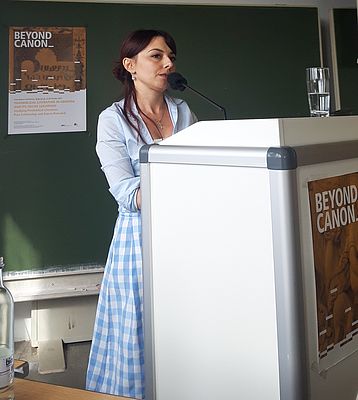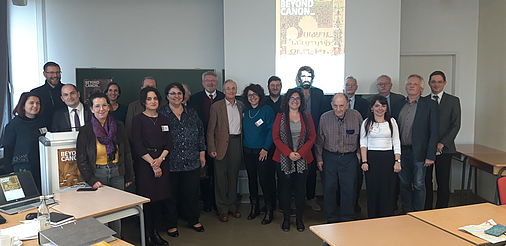Parabiblical Literature in Armenia and its Social Locations
The international conference on Armenian parabiblical literature united with the combination of traditions “beyond the canon” and Area Studies two major research areas at UR
13 Nov. 2023
Late October, the Centre for Advanced Studies „Beyond Canon_“ (DFG-FOR 2770) hosted a four-day international conference titled “Parabiblical Literature in Armenia and its Social Locations. Studying Parabiblical Literature: Past Scholarship and Future Potential.” It was organized by Dr. Mari Mamyan (DFG position, former postdoctoral Fellow at “Beyond Canon_”) and Prof. Dr. Tobias Nicklas, Director General, CAS „Beyond Canon_“.
Luminaries alongside many young female researchers in international Armeniology
For this occasion, numerous well-renowned Armenian scholars came to Regensburg. Many scholars from Yerevan, especially young women, like Dr. Lusine Sargsyan and Seda Manukyan, impressed with their excellent research contributions. In addition, the presence of the assembled international notables from the broad discipline also caused attention and testified to the high reputation of Regensburg in this field, which could only have been achieved thanks to the great success of "Beyond Canon_". From Jerusalem and California participated with Prof. em. Dr. mult. Michael E. Stone and Prof. em. Dr. Abraham Terian two personalities, who have shaped the field through their research over many decades and continue to do so today. Through their numerous positions as visiting scholars and professors at various academic institutions worldwide, they were able to build up a network from which "Beyond Canon_" benefits today and which has been expanded to include the UR through the fruitful research in Regensburg.
Armeniology: Yerevan and Jerusalem as centres next to France, the US, and Italy
Prof. Stone, Emeritus of the Hebrew University of Jerusalem and doyen of Armeniology, celebrated his 85th birthday in Regensburg despite the war starting shortly before his arrival. Prof. Terian’s biographical roots also lie in Jerusalem, specifically in the Armenian quarter of the city, which, together with the presence of other academics, e.g., Dr. Shlomi Efrati from Israel, proved to be a central node of the network alongside Yerevan. Prof. Dr. Gregory Sterling/Yale Divinity School travelled from the US, who did not want to miss being a presenter at the conference even though a meeting of the deans of Yale University – of which he is one – was scheduled at short notice almost at the same time. The chance to take part in the conference in Regensburg was not only an opportunity to meet up with long-standing friends, but also to get to know the Centre personally and thereby strengthen the relationship between Yale and the UR.
Young armeniologist Dr. Mari Mamyan established Regensburg as a further center of the subject
For almost five years, the main organizer of the event, Dr. Mari Mamyan, has been living in Regensburg. Coming from Matenadaran, the Mesrop Mashtots Institute of Ancient Manuscripts in Yerevan – like many participants of the conference –, she started her postdoctoral career at the Centre in Regensburg and successfully applied for her own DFG position while being a fellow at “Beyond Canon_”. Through her success story, Mamyan has made and continues to make a valuable contribution to the international visibility not only of herself and her discipline, but also of the Centre “Beyond Canon_” in Regensburg. She stated: “A considerable amount of research conducted in the field of Armenian Studies has made it possible to reveal the distinctive character of Armenian Christian culture. However, most of these achievements are known only to narrow experts, while broader societies still have a rather vague understanding of Armenia and its past. The conference, organized by the Centre for Advanced Studies ‘Beyond the Canon_’ at the University of Regensburg which brought together leading specialists and young scholars, is a significant contribution not only to the deepening of our knowledge about the Armenian apocryphal tradition but also to the Armenian Studies in general.”

Dr. Mari Mamyan © Charlotte von Schelling/“Beyond Canon_”
The conference of the Centre covered parabiblical traditions "beyond the canon" and area studies as well
Bible reception, parabiblical traditions, and the construction of identities in a specific region and in the diaspora were highlighted in the numerous presentations at the conference. The research projects presented were thus dedicated to two profile-building research focal points of the UR: traditions beyond the biblical canon and area studies, which in this inseparable interlocking also form a focus of the Centre.
Armenia, which experienced a humanitarian catastrophe in September 2023 due to the near complete expulsion of the population from Nagorno-Karabakh/Arzakh, which largely took place in the “blind spot” of global political attention, is a socio-cultural region that is particularly topical, not only because of this, but also and above all because the danger, that numerous monuments are threatened with destruction as a result of recent developments, must be countered. The support from Regensburg is strong. Prof. Nicklas stated accordingly: “With this world-class conference, Beyond Canon not only wants to deepen its work on Armenian Apocrypha, but also to provide a platform to create a deeper awareness of the fascinating and at the same time highly threatened culture of Armenia, whose suffering in the past, but also today again, especially here in Germany, must not be overlooked.” The cultural heritage in particular was highlighted by Prof. em. Dr. Bernard Outtier from France, who noted, “something which is immediately understable for everyone is the very rich artistic heritage left by the copyists-illuminators of so many manuscripts, and the architects of so many old churches and monasteries. These last years and months gave us very bad apprehensions concerning the future of this wonderful heritage: we have to try to do everything possible to avoid his possible annihilation.” Prof. Dr. Harald Buchinger, Director of the Centre, declared: “Throughout history the Armenian people has shown that being open to cultural, intellectual, and religious influences from all around and maintaining one's own distinctive identity need not be a contradiction. Studying the Armenian heritage is an exercise in openness and integration.”

Participants of the conference © Charlotte von Schelling/“Beyond Canon_”
Information/Contact
Charlotte von Schelling
UR - Universität Regensburg
Centre for Advanced Studies "Beyond Canon_" (FOR 2770)
E-Mail: Charlotte.Von-Schelling@ur.de




